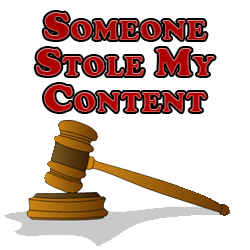Say you find your exact same content on someone else’s site, word for word. Maybe someone else brought it to your attention in the first place, but either way, it’s your content which has been illegally stolen and published on someone else’s site. You may even just do searches for your content every now and then in quotes to see where it’s been published verbatim online. You’d be surprised at how easily and often you can find your content stolen and published elsewhere. If you’ve been in the position where you’ve said someone stole my content, consider this as what you can do.
Someone Stole My Content
Regardless of how you stumble upon the offending stolen content, the first thing you can do is send a direct message to the webmaster of that site. Most blogs have a page notifying you of how to contact the author and owner of that site. Ideally you can send them a message, give them the benefit of the doubt and explain the situation, and hope that they take it down. If they don’t respond or you simply can’t find out how to contact that webmaster, you have a powerful tool at your disposal to help ensure that it gets taken down. This is the DMCA notice.
What Is a DMCA Notice
A DMCA notice is a “takedown notice” designed to be sent to the hosting provider of the site which your content has been infringed. In a DMCA notice you’ll typically include:
1 – Your signature, provided you’re the owner of the copyrighted material or can act for the actual owner. Also include your contact information.
2 – A description of your work including titles and links where they can be found on your site.
3 – A description of the infringed version of your work including the URL of the infringing site.
4 – Statements that you “a good faith belief that use of the material in the manner complained of is not authorized by the copyright owner, its agent, or the law” and that “the information in the notification is accurate, and under penalty of perjury, that the complaining party is authorized to act on behalf of the owner of an exclusive right that is allegedly infringed.”
You’ll find that after sending this, the hosting provider will usually comply with your DMCA notice rather quickly because they escape liability of hosting stolen content so long as they make a serious attempt to accomodate your DMCA take down request.
You can do a quick WHOIS check to find out where someone’s site is hosted, then refer to the Registrar of Copyrights’ directory of addresses where you can direct your DMCA notices to for each hosting company: http://www.copyright.gov/onlinesp/list/a_agents.html.
